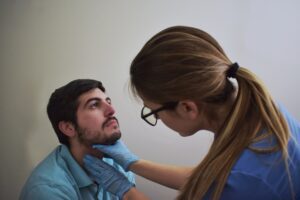

Returning to work after an injury or extended absence can be a challenging transition for employees. It requires careful assessment and planning to ensure a successful return while minimizing the risk of re-injury or complications. That’s where Advanced OccMed comes in. With their expertise in facilitating successful transitions, they offer comprehensive return-to-work exams tailored to individual needs. In this blog post, we will explore the importance of return-to-work exams and how Advanced OccMed plays a vital role in this process.
Return-to-work exams, also known as fitness-for-duty exams, are medical evaluations conducted to assess an individual’s readiness to return to work. These exams play a crucial role in ensuring a smooth transition and minimizing the risk of re-injury or aggravation of existing conditions. They benefit both employers and employees by identifying any necessary accommodations or modifications and assessing the individual’s ability to perform job tasks safely and effectively.
Legal and regulatory considerations are also important in the return-to-work process. Compliance with relevant laws and regulations ensures a fair and equitable process for employees. Advanced OccMed understands these considerations and ensures their return-to-work exams align with legal requirements.
At Advanced OccMed, facilitating successful transitions is their expertise. They employ a comprehensive approach to return-to-work exams that is tailored to individual needs. Their process involves collaboration with employers, employees, and other stakeholders to ensure the best outcomes.
A key component of their approach is a comprehensive medical evaluation. This includes a detailed medical history assessment to understand the individual’s health status and any factors that may impact their return to work. Additionally, a thorough physical examination is conducted to assess functional capabilities, such as range of motion, strength, flexibility, and other relevant factors. Diagnostic tests and screenings may also be performed to identify any underlying conditions or limitations that need to be addressed.
To ensure a successful return, Advanced OccMed customizes their assessments based on job requirements and individual needs. This involves a review of the specific job demands and physical requirements. By considering the individual’s skills, abilities, and limitations, they can identify potential accommodations or modifications that will facilitate a smooth transition.
A comprehensive return to work exam conducted by Advanced OccMed includes several important components:
Medical History Assessment: Gathering information about the individual’s medical conditions, treatments, and medications is crucial to understanding their overall health status. This assessment also helps identify any work-related factors that may impact the return to work process.
Physical Examination: A thorough physical examination is conducted to evaluate the individual’s overall physical health and fitness. This includes assessing factors such as range of motion, strength, flexibility, and any specific physical requirements related to their job.
Diagnostic Tests and Screenings: Depending on the individual’s medical history and specific circumstances, Advanced OccMed may perform diagnostic tests and screenings. These may include X-rays, MRIs, or other imaging tests to assess musculoskeletal conditions, as well as laboratory tests to evaluate general health and identify any underlying medical issues.
Functional Capacity Evaluation: A critical aspect of the return-to-work exam is assessing the individual’s ability to perform specific job tasks. This evaluation tests their physical capabilities, endurance, coordination, and other factors relevant to their job requirements.
Psychological Assessment (if applicable): In some cases, a psychological assessment may be necessary to evaluate the individual’s mental health, coping skills, and readiness to return to work. This assessment helps identify any psychological factors that may impact the transition process and ensures appropriate support is provided.
Based on the findings of the return-to-work exam, Advanced OccMed works closely with employers, employees, and other stakeholders to develop a comprehensive return-to-work plan. This plan outlines the necessary accommodations or modifications that need to be implemented to facilitate a successful transition.
The return-to-work plan may include:
Gradual Return: Recommending a gradual return to work, starting with modified duties or reduced hours and gradually increasing workload as the individual progresses.
Accommodations: Identifying specific accommodations, such as ergonomic adjustments, assistive devices, or workplace modifications, to support the individual in performing their job tasks safely and effectively.
Rehabilitation Services: Referring the individual to rehabilitation services, such as physical therapy or occupational therapy, to improve functional capabilities and enhance the return-to-work process.
Education and Training: Providing education and training to the individual, supervisors, and coworkers to increase awareness and understanding of the individual’s needs and ensure a supportive work environment.
Transitioning back to work can evoke concerns and challenges for both employees and employers. Advanced OccMed recognizes the importance of proactive communication and support during this process. They work closely with all stakeholders to address concerns, provide guidance, and offer support services as needed.
Proactive communication involves open and honest discussions with the individual, their supervisor, and the human resources department. This helps identify and address any concerns, clarify expectations, and ensure a smooth reintegration into the work environment.
Advanced OccMed may also offer additional support services, such as counseling or vocational rehabilitation, to assist individuals in overcoming psychological or vocational challenges they may face during the transition.
A successful return-to-work exam facilitated by Advanced OccMed offers several benefits for both employees and employers:
Reduced Risk of Re-injury or Complications: Identifying and addressing any underlying conditions or limitations through the return-to-work exam helps minimize the risk of re-injury or complications. By implementing appropriate accommodations or modifications, employees can safely and effectively perform their job tasks.
Improved Employee Morale and Satisfaction: Empowering employees to regain their independence and productivity through a successful return-to-work process has a positive impact on their morale and satisfaction. It fosters a sense of accomplishment, job security, and overall well-being.
Minimized Productivity Losses for Employers: Facilitating a timely and smooth transition back to work minimizes productivity losses for employers. It reduces the financial impact of prolonged absences or disability claims, while also maintaining continuity in the workplace.
Compliance with Legal and Regulatory Requirements: By adhering to relevant laws and regulations, employers ensure a fair and legally compliant return-to-work process. This mitigates the risk of legal disputes or non-compliance penalties.
A successful return to work after an injury or extended absence requires careful assessment, planning, and support. Advanced OccMed plays a vital role in this process by offering comprehensive return-to-work exams tailored to individual needs. Their expertise in facilitating successful transitions minimizes the risk of re-injury or complications, improves employee morale, and ensures compliance with legal requirements. By prioritizing the well-being and productivity of both employees and employers, Advanced OccMed sets the stage for a smooth and successful return to work.
A return to work exam is a comprehensive medical assessment conducted to evaluate an employee’s physical and mental fitness to return to work after an illness, injury, or extended absence.
The return to work exam is important as it ensures that employees are capable of performing their job duties safely and effectively, minimizing the risk of further injury or health complications.
Return to work exams are usually conducted by occupational health professionals, such as occupational medicine physicians or certified occupational health nurses.
A return to work exam may include a thorough medical history review, physical examination, functional capacity assessment, psychological evaluation, and any necessary diagnostic tests to determine an employee’s readiness to return to work.
Advanced OccMed specializes in occupational medicine and offers tailored return to work plans, collaborating closely with employers and employees to ensure a smooth transition. They provide comprehensive assessments, expert medical guidance, and customized solutions to address individual employee needs.
Yes, the return to work exam plays a crucial role in identifying any potential health issues or limitations that could contribute to workplace accidents. By assessing an employee’s fitness for work, employers can implement appropriate accommodations or modifications to mitigate risks.
Yes, early detection of health issues through return to work exams can lead to cost savings for employers. By identifying potential risks or limitations early on, employers can implement preventive measures, reduce absenteeism, and minimize the financial impact of workplace injuries or health-related incidents.
Employees can prepare for a return to work exam by gathering any relevant medical documentation, providing accurate information about their health condition and limitations, and communicating openly with the healthcare professionals conducting the exam.
These websites can serve as valuable references for readers seeking further information and resources related to return to work exams and successful transitions in the workplace.




